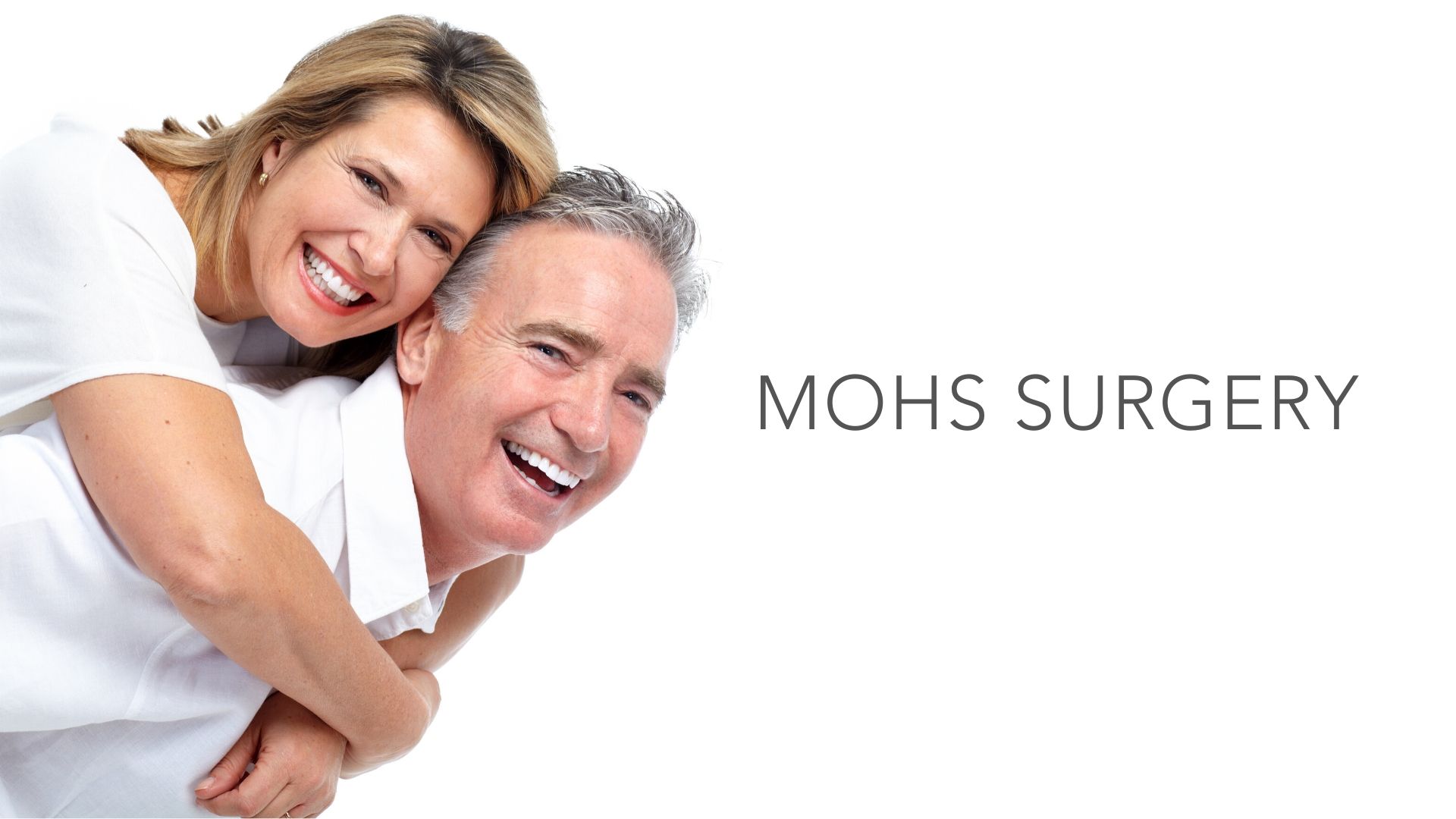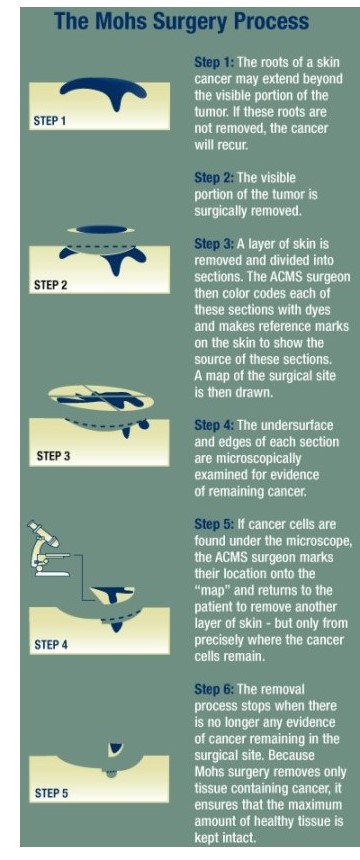Thank you. Your Consultation Request Has Been Submitted.
For expedited booking or further inquiries about the Mohs Surgery please call us at 203-428-4440 during office hours.

What is Mohs surgery?
Mohs surgery is the single most effective and best technique for removing Basal Cell Carcinoma and Squamous Cell Carcinoma (BCCs and SCCs), the two most common skin cancers, with a cure rate of 99%. Mohs surgery can also be used to treat some melanomas. Mohs surgery is also the best method for tissue sparing (removing the entire cancer with minimal removal of normal skin). Following removal of your skin cancer, reconstructive surgery can be done to repair (close) the defect (hole) created by removal of the cancer with the latest surgical advances. Mohs and Reconstructive Surgeons who have completed a fellowship in Mohs surgery and are members of the American College of Mohs Surgery perform more facial reconstruction of skin cancer defects (holes) than any other specialty, including plastic surgery, facial plastic surgeons and oculoplastic surgeons.
Why Choose Dr. Omar Ibrahimi at the Connecticut Skin Institute as your Mohs Surgeon?
- Dr. Omar Ibrahimi is a fellowship trained Mohs and Reconstructive Surgeon and is a member of the American College of Mohs surgery. When meeting with a surgeon for Mohs surgery, be sure to ask your surgeon if they are fellowship trained and a member of the American College of Mohs surgery. Dr. Ibrahimi completed his dermatology training at Harvard Medical School and his Mohs and Reconstructive Surgery fellowship at University of Calfornia- Davis.
- Dr. Ibrahimi’s main goal is to remove your skin cancer completely with the best cosmetic results possible. Dr. Ibrahimi is a reconstructive surgeon AND a nationally recognized laser expert specializing in scar revision. Dr. Omar Ibrahimi has been honored as a Castle-Connolly Top Doctor because of his work as a Mohs surgeon. We have many patients that come to us for scar revision from surgeries they may have had elsewhere. As a patient of Dr. Ibrahimi, you get the best of both world – a phenomenal surgeon and a laser expert to minimize the appearance of scars.
- Dr. Ibrahimi specializes in the reconstruction of difficult skin cancer cases, has published numerous articles on skin cancer reconstructive surgery and has lectured to other Mohs surgeons and dermatologists about Mohs and Reconstructive Surgery.
- Dr. Omar Ibrahimi is highly regarded by both patients and other physicians alike for his reconstructive abilities. He has been the “go to” Mohs surgeon for other physicians, their spouses, and prominent citizens of Fairfield County and beyond. He has taken on challenging skin cancer cases that other Mohs surgeons in the state have shied away from.
- His fellowship training in California’s Sacramento Valley has prepared him to handle the most difficult of skin cancer cases beyond those typically encountered in the New York Metro and New England area. The success and cosmetic outcome of the procedure is highly dependent on the skill of the surgeon you select. Our before and after pictures are a representation of some of Dr. Ibrahimi’s work.
- Our entire office is focused on excellence and providing the highest level of care possible for patients requiring Mohs surgery. In this era of cost conscious healthcare where many patients have large deductibles and have to pay a portion of their bill, it is important to note that Dr. Omar Ibrahimi performs his surgeries in an outpatient setting, leading to a far lower overall cost than if this procedure was done at an academic center or hospital.
If you are looking for a nationally respected Mohs surgeon, Dr. Omar Ibrahimi is one of the few Mohs surgeons in the entire state who has been invited to lecture at the American College of Mohs Surgery annual meeting.
To see before and after examples of Mohs and Reconstructive surgery performed by Dr. Omar Ibrahimi click here to be taken to our Mohs and Reconstructive surgery “Before & After” gallery. Our office also has an additional large portfolio of Dr. Omar Ibrahimi’s actual surgical results that can be reviewed during the in-person consultation.
Watch a video below of Dr. Omar Ibrahimi and one of his patients commenting on Mohs and Reconstructive Surgery.
*
Watch the video below for an overview of Mohs surgery.
*
We are proud to state that Dr. Omar Ibrahimi is a member of the American College of Mohs surgery. Please be aware that there are physicians who perform Mohs surgery that have not completed advanced fellowship training and are not part of the American College of Mohs Surgery. Make sure you ASK your Mohs surgeon if they are a member of the American College of Mohs Surgery.

A brief picture overview of the Mohs surgery process *
 *
*
Commonly asked questions about Mohs and Reconstructive Surgery
Q: Should I have a consultation?
A: The consultation is important because it allows the doctor to examine your skin cancer, review your medical history, explain the procedure, and determine if Mohs surgery is the best treatment for you. Sometimes, the surface of the cancer appears to heal up quite well following the biopsy and can be difficult to find. Having a consultation prior to the surgery enables the Mohs surgeon to identify and confirm the site with you prior to the surgery and if need be to confirm with the referring doctor. With a consultation, this can all be done in advance of the surgical date. In rare instances, a consultation in advance of the surgery can be skipped if the patient has had Mohs surgery previously and understands what to expect, and is able to mail a photo of the biopsy site to us in advance.
Q: How long does the procedure take?
A: Due to the time involved in the processing of the tissue and the possibility that more than one stage of removal may be required, the procedure can take two to six hours. Much of the time will be spent in the patient lounge, so it is suggested patients bring something to read or an activity to pass the time. Surgery takes place in the early morning or early afternoon. Our office is equipped with a wireless network for patients. We offer a variety of complimentary snacks for our Mohs surgery patients.
Q: How effective is the procedure and why is it better than any other treatment?
A: Treatment of basal cell and squamous cell carcinomas with the Mohs technique is 99 percent effective. The examination of the tumor is more thorough and tissue loss is significantly less than other procedures.
Q: Will I have a scar?
A: Yes. Any type of surgical treatment will leave a scar; however, the Mohs procedure minimizes this. Additionally, Dr. Ibrahimi specializes in the reconstruction of difficult skin cancers, so rest assured that you are getting a Mohs and Reconstructive surgeon who is comfortable dealing with all ranges of complexities and as evident by his patient reviews and national stature, is one of the best Mohs & Reconstructive Surgeons in the country. Additionally, Dr Ibrahimi is a leading expert in the use of lasers to treat all forms of scarring.
Q: Will I be medicated for the procedure?
A: Only local anesthetic is needed for the Mohs procedure. If anxiety or other medical conditions require you to have other medications to relax prior to the procedure, this should be brought up to discuss with Dr. Ibrahimi at the initial consultation visit.
Q: Do I need to bring anyone with me?
A: If your surgery is located around your eye or is extremely large, it may be helpful to have someone drive you home. Otherwise it’s not required, but it’s a good question to ask your Mohs surgeon at your consultation visit.
Q: How should I prepare for Mohs surgery?
A: We provide all our patients with written instructions they can review. Try to get a good night’s sleep. Fasting isn’t necessary, but don’t drink alcoholic beverages for 48 hours before surgery.
Q: What happens after the skin cancer is removed?
A: Once the tumor is completely excised, the surgeon will evaluate the wound and discuss repair options that include stitches, letting the wound heal naturally, a skin flap, or a graft.
With stitches or a graft, the wound will heal in one to two weeks and over a period of months continued cosmetic improvement will be seen. If the wound is allowed to heal naturally, the tissue will grow back slowly in four to eight weeks (this is referred to as a second intention).
Regardless of the choice of repair, the wound should not be allowed to dry up and scab. Daily application of Vaseline is required until the wound is completely healed. Patients will receive complete wound care instructions from the surgeon along with some supplies.
Dr. Omar Ibrahimi specializes in the reconstruction of skin cancer defects and aims to provide the optimal cosmetic result for his skin cancer patients. We offer all of our Mohs patients follow-up visits to ensure they are happy with the outcome of their procedure.
Q: Will it hurt after the surgery?
A: It’s rare that patients complain of pain after the procedure, though occasionally a headache or mild discomfort may ensue. In most cases, Tylenol or an ice pack lessens the discomfort. Aspirin or ibuprofen should be avoided.
Q: What about bleeding after the surgery?
A: Bleeding is rare after Mohs surgery but if it happens; lie down and place steady, firm pressure over the bandage for 20 to 30 minutes. Do not remove the bandage to see if it’s still bleeding. If the bleeding persists contact our office or go to the nearest hospital emergency room.
Q: What else can I expect afterwards?
A: All wounds develop a small halo of redness. This is normal inflammation. Occasionally, a red, bumpy rash with severe itching may develop. This usually indicates an allergic reaction to the tape. If this happens, contact our office for further instruction.
Patients who’ve had surgery around the eyes can expect mild to moderate swelling and occasional bruising. Using ice packs 24 to 48 hours after surgery for no more than 15 minutes each hour, may reduce swelling.
After the wound has healed, patients may experience redness and tightness which will gradually diminish. Sometimes, nerves in the surgical area are affected, resulting in numbness. Sensation may take a year or more to return, but rarely is it permanent.
The Mohs surgeon follows the patient until the wound is healed. Patients are then discharged back to their general dermatologist for follow up.
Q: Since I’ve had skin cancer, how often should I have my skin examined?
A: Skin cancer patients have a 50 percent chance of developing it again. To catch new skin tumors in the early and most treatable stages, a full-skin exam with the dermatologist is advised every six months.
Q: Does my insurance cover Mohs surgery?
A: Yes. Mohs surgery is considered the standard of care for certain skin cancers. Importantly, because we perform Mohs surgery in a private practice outpatient setting, the overall cost of the procedure is lower than it would be if you were to have Mohs surgery at an academic center or hospital.
Please refer to the excellent links below from the American College of Mohs Surgery for further information. These will open in a new window. Simply close the window to return to our website.
- The Mohs Procedure
- Reconstruction and Post-Operative Care
- Frequently Asked Questions About Mohs and Reconstructive Surgery
Click here for a sampling of the peer reviewed research articles written by Dr. Omar Ibrahimi
